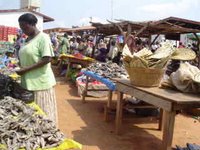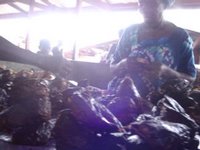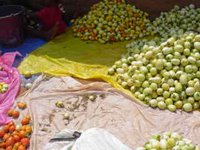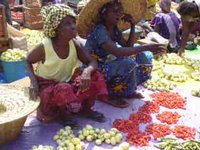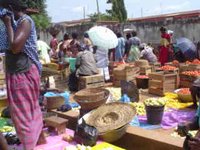I realize that my posts so far have been a little superficial so I thought I’d post more of a reflection this time.
Some thoughts that have been going through my head here… Well, first off, let me start by talking of something I read that really provoked me, so you all know where these ideas are coming from. I was reading “The End of Poverty” by Jeffrey Sachs (many of you probably remember me buying it before I left and talking excitedly about it). Well, the book stinks. I haven’t read all of it, but just the first chapter made me lose all respect for the author- essentially, he and I don’t approach the world carrying the same set of assumptions (thank God).
For example (and this will all tie in to Ghana- I promise), he talks about workers in factory sweatshops in Bangladesh, saying what a good opportunity it is for the workers because they make, on average, eight times more than the average agricultural worker in Bangladesh. However, he completely ignores the fact that those two workers will have a completely different cost of living. Let’s use Ghana as an example.
Accra is the capital of Ghana, as well as its largest city. Accra is also notoriously the most expensive city in Ghana, and the cost of everything from rent to food to clothes to transportation steeply increases in Accra.
Then let’s compare the family of farmers I stayed with in Nkwanta. The cost of living in Nkwanta is extremely low. This family, while producing cocoa as a cash crop, also grows corn, tubers, vegetables, and fruit as well as raising goats and chickens for meat. They own their own house. They have no running water or electricity. They use buses and taxis; they don’t own a car.
So how much money would a family in Accra need to survive? They would pay rent, electric bills, and water bills on top of the expensive food, clothes, transportation, etc. I couldn’t give you an exact number since I haven’t done a study on this- I’m just giving the facts.
Then the family of farmers. Their energy costs are measured in ounces of kerosene for lamps and lanterns and pounds of charcoal for cooking- with the occasional set of batteries for a radio. They buy very little of their food and eat what they grow. Of course, they’ll still need some money- for clothes and utensils, school fees and visits to doctors. But most of their day to day needs are taken care of. No rent to pay. Very few bills.
So saying that a street hawker in Accra makes 8 times more than a farmer in the Eastern Region is essentially a meaningless statistic; it gives you no framework to know which person lives in poverty, which person has a harder time meeting the bare necessities of life. It sounds like a consequential, but really tells you nothing without more information.
He also talked about GNP, another meaningless statistical tool. While it tells you how much money came into the country, it gives you no clue as to where and whom it went to; therefore, it gives no measure of people’s living condition, income, or the level of poverty experienced. So if, for example, the sweatshops in Bangladesh are making a small elite much more wealthy, while keeping the majority of the population just as poor or making them even poorer, the GNP can still rise and the world will regard that as a good thing. Even if the majority of the country’s population is still struggling for necessities, perhaps even becoming more desperately poor, a rise in the GNP is a good thing.
But enough about the book. Time to get less political and more philosophical…
This line of thought brought me to ponder the whole idea of wealth. Going back to the family of farmers, they didn’t seem to feel impoverished or deprived. Living with them, I certainly didn’t feel deprived. The family is, overall, well-liked and respected. They live in a comfortably large compound, and seem to have plenty to eat. In fact, they have enough for their large family of 12, plus enough to share with people like me and Mus, or the 4 teachers and their families that live there. Plus various grandchildren and nephews and such also live with them.
Still, I imagine the family has very little disposable income- in fact, all the families were considering how to raise money to have electricity installed while I was there. To these families, $10 is a lot. So are they poor? Are they impoverished? Do they have a comfortable standard of living?
I don’t know how to answer these questions. I mean, they are basic questions- what is wealth? Is it measured in happiness? In the quality of life? In money? In possessions? In net worth? I mean the net worth of these people is probably pretty decent, though they have little disposable income…
Kind of like the old one I go back to… What is success? How does a person live a successful life?
